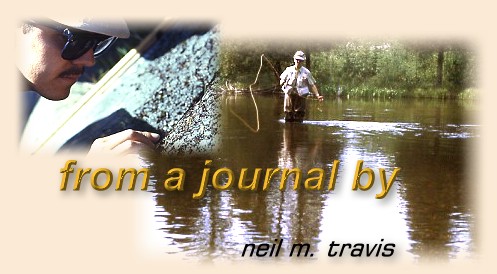WHY?
Last week I wrote that, for me, fly-fishing is a necessary passion. Some would call my description an obsession, which is an idea or feeling that completely occupies the mind. While I would admit that there was a time in my life when the word obsession would have more accurately described my mindset about fly-fishing, but time and, what I hope is maturity, has mellowed my obsession into a passionate emotional attraction.
Whatever my personal way of thinking may be about fly-fishing the fact remains that there are many viable reasons for fly-fishing, and I suspect that there are as many reasons as there are participants.
There seems to be a progression that takes place in all anglers. I remember when I started fishing as a very young boy I just wanted to catch a fish. It was a sense of accomplishment mixed with a desire to possess something. This desire was sparked by seeing several fish, probably suckers or some other similar species, swimming around some large rocks in the Delaware River near my boyhood home in Upstate New York. I was about 4 years old, but my mother told me later that I was captivated by those fish, and that was all I could talk about for weeks afterward. In my minds – eye I can still see those fish as vividly as if it were yesterday.
It wasn’t too long before I caught my first fish, which I think was a brook trout from the small brook that ran through our hay field. That was long before the idea of ‘catch and release’ or ‘flies only’ fishing was part of my vocabulary, which is just as well since brook trout, the native char of the waters of my childhood, were quite plentiful in those small brooks. Over the intervening years many of these speckled beauties fell victim to my skill with hook and worm.
As my confidence grew I went through the inevitable stage of wanting to catch as many fish as possible. It seemed obvious that the person that caught the most fish was the best angler, and the desire to reduce to possession as many fish as was legally permissible became an unspoken goal. Many bluegills, crappie, perch and even trout gave their lives to satisfy my desire to fill a stringer full of death fish carcasses.
Gradually my need to catch a boat load of fish was replaced by a desire to catch big fish. I still wanted to catch lots of fish, but they needed to be BIG fish. While I never succeeded in catching anything that might be especially noteworthy, no records, no wall fish, but I did succeed in catching some fish that could be considered big by most folk’s estimation.
This evolution took place before I became serious about fly-fishing, so by the time I took up the long rod as an exclusive means of catching fish the urge to fill a stringer full of large dead fish had passed. However, I was back to the beginning again, I just wanted to catch a fish on a fly. Unlike running worms through a fishy looking spot I soon discovered that in order to consistently catch fish with artificial flies required more than a ‘chuck and chance it approach.’ Thus began the odyssey that continues to drive me to this day.
In my development as a fly-fisher the initial drive was the need to know. There was so much to learn, so many challenges, so many things that needed to be perfect, that needed to become habitual if I had any hope of success. The learning curve was steep in those early days, but in hindsight those were some of the most exciting times.
After having achieved a degree of competency the desire to become ‘the best,’ a cut above, one of the elite in the sport began to resonate within my psyche. It was within my grasp, or so it seemed, an admirable achievement, a goal worthy of pursuing. It was a short lived pursuit that fortunately I soon abandoned.
With time has come the realization that being ‘the best’ at something is a relative state of thinking; an ethereal reality that exists mostly in the mind of the person holding title, and adds little to the experience but much to the ego.
It has been nearly a half a century since I first picked up a fly rod and seriously began to contemplate fly-fishing as a viable fishing method. The learning curve has not bottomed out, but it certainly is less intimidating. The need to know has been replaced with a settled sense of knowing, and a contentment that comes with a satisfactory degree of competence. Today it has less to do with catching fish and more to do with catching the moment. To a degree I think that I have come full circle.
While fishing with rod and fly has shaped my life in ways that I could never have imagined and has, in a true sense, become a necessary passion, the reason why I still find it so compelling has changed with the passage of time. I suspect that, given time, it will also happen to you.
